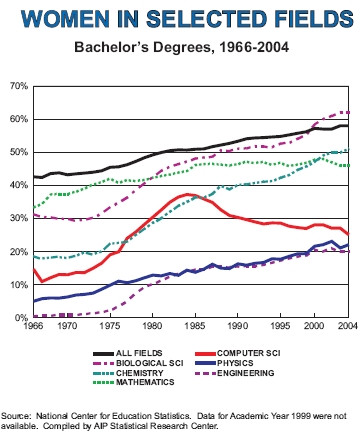The Elephant in the Computer Lab
The lack of women in the computing fields is something that is surprisingly controversial. I’ve dug through countless websites and threads following the discussion of this issue and found many arguments, shockingly, against treating this as a problem that needs to be solved. Instead, many of the arguments would rather dismiss any problem rather than attempt to fix the status quo. The very notion is a fairly dangerous one when it comes to under-representation in any field. I realize that the anonymous nature of the Internet and the existence of trolls causes some parties to say things that they don’t really believe or wouldn’t say otherwise, but I do notice arguments that seem common and widespread enough to silence. I refer to the majority of these arguments as non-arguments since they neither exist in reality nor are founded on any actual data.
1. “There is no lack of women in the computing fields”
It’s a simple matter of examining the hard data to understand just how much of a non-argument these statements are. The actual percentage of women in the computing fields in 2009 was 25%, while the total percent of the professional workforce was 58% [1]. These numbers are not improving nearly as quickly in computer science as all of the other STEM fields and actually has been declining since 1985[2]. In 2010 only 13.8% of the bachelor degrees in computer science were awarded to women, which is surprisingly an increase from the previous year[3].

2. “If more women wanted to be in the computing fields they would be”
This is based on the belief that men and women each have their own distinct places in society. However, numerous studies have been done to show that these apparent differences are the result of social constructs rather than that of brain function differences. Primarily, one of the major concerns in computer science is the supposed lack of female mathematical abilities. Data suggests that male and female mathematical performance is equivalent [4]. Dr. Justin Baley has a great paper on the perceived differences between men and women and how these are social constructs more than they are biological ones [5]. “Despite decades of searching for differences, the evidence does not support large or even moderate gender differences, much less a ‘different worlds’ analogy” (Bailey, 4). The most convincing data point in support of women actually wanting to become computer scientists happens to be the fact that simply by revamping the CS program at Harvey Mudd College the female enrollment in CS is now 42% well over the 14% seen elsewhere [18].
3. “Lack of women in computing is not a problem”
“Becoming a Computer Scientist” (Amy Pearl et al.) does a fairly good job of addressing the real problem with the lack of women in computer science. From the perspective of the raw numbers the number of white men entering high education has been decreasing (the primary demographic for computer scientists) while the demand for computer scientists has been increasing [6]. The lack of women in computer science indicates that there is something at work preventing women from entering it [7]. Limiting the field to just men is rather detrimental; there is even data that shows that women on teams help improve performance [8]. If you restate the argument as “lack of women in computing is not a problem it’s a symptom of bigger societal problems” we end up with a statement that we can use to help improve the situation rather than just ignore it.
4. “Patriarchy doesn’t exist”
This argument comes about in many different forms, but it comes down to the idea that the existence of patriarchy in our society is completely false. “Patriarchy refers to any social system in which men are the dominate force. […] Wherever women’s choices are limited by the decision-making power of men, patriarchy exists.” [9]. However, women only make up 17% of the senate and only about 22% of the house [10]. In the business world there are only 12 women running fortune 500 companies [11]. Additionally, The wage gap in the U.S. is still very real. “Women in the United States still earn only 78 cents on the dollar compared to men” [12]. Patriarchy is still alive and well in the U.S.
- “There is nothing stopping women from being in computing fields”
There was a study that infers that the geek stereotype is what is driving women out of computer science [13]. I think that the geek culture itself that is pushing them out. Women are seen as “quota-fillers” rather than peers [14]. The cultural belief that women programmers are naturally worse than men discourages women from becoming a part of the programming community [15]. Additionally, a field already deficient of women should not participate in the defense of sexist remarks or actions [16]. The geek feminism wiki lists 96 other high profile incidents of sexism in the tech community [17]. Other STEM fields have trended positively to become a 50/50 split [2]. The fact that Computer Science has not shows that there are factors that discourage women from being introduced or contributing to the field.
There is no question anymore as to the existence of this problem. We as a community need to acknowledge it and move forward. The problem is not a simple one to solve and it is only together that we can begin to make progress. We cannot as a community continue the mistakes of the past if we are to hope for change. It is a time for mentors to step up and educate the next generation. Now is the time for us to unite and come up with solutions.
References
- NCWIT: By the Numbers
- American Institute of Physics: Women in Selected Fields
- CRA Taulbee Survey
- Science Daily: No Gender Differences In Math Performance
- Men are from Earth, Women are from Earth: Rethinking the Utility of the “Mars/Venus” Analogy By Justin P. Bailey, Ph.D.
- Wanted Analytics: Computer Programmers Are in Demand - Employers Post 220,000 New Jobs over Past 30 Days
- Amy Pearl, Martha E. Pollack, Eve Riskin, Becky Thomas, Elizabeth Wolf, and Alice Wu. 2002. Becoming a computer scientist. SIGCSE Bull. 34, 2 (June 2002), 135-143. http://doi.acm.org/10.1145/543812.543847
- Harvard Business Review: Defend Your Research: What Makes a Team Smarter? More Women
- Encyclopedia of Women’s Autobiography: K-Z By Victoria Boynton, Jo Malin
- Congressional Research Service: Women in the United States Congress: 1917-2011 By Jennifer E. Manning and Colleen J. Shogan
- CNN Money: Fortune 500: Women CEOs
- Center for American Progress: Wage Gap by the Numbers
- MSNBC.com: Geeks drive girls out of computer science
- Microaggressions: Guy at Linux Event
- A Foo walks into a Bar…: Are women worse programmers than men?
- OSnews: Richard Stallman’s Possibly Sexist Remarks at GCDS
- Geek Feminism Wiki: Incidents
- The Number of Female Computer Science Majors Has Tripled at Harvey Mudd College - Thanks to This Woman
- Male Programmer Priviledge Checklist
- Gender News: Researcher reveals how “Computer Geeks” replaced “Computer Girls”
- Reddit: The Importance of a Code Literate Culture Comments
- Reddit: Where did all the female programmers go? Comments
- Hacker News: The Computer girls (1967 issue of Cosmopolitan) Comments
- Reddit: Too Few Women In Tech? Stop Blaming The Men. Comments
- Seldo.com: Arrington is completely wrong about women in technology
- Reddit: Arrington is completely wrong about women in technology Comments
- A Campus Champion for Women in Computer Science
